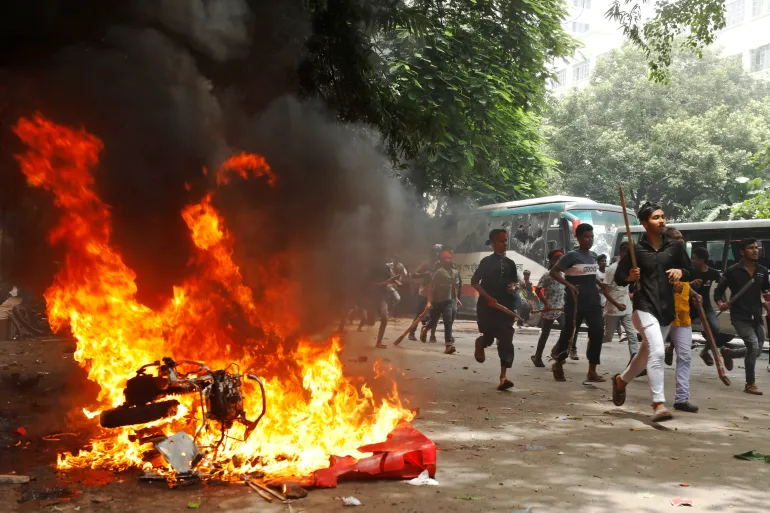
The abrupt and forced retirement of Sheikh Hasina from Bangladesh’s political scene has left many, including those in India, taken aback. Having worked closely with her and the Bangladesh administration, I often observed her business acumen and dedication to improving the lives of Bangladeshi citizens while fostering stronger ties with key markets. However, it appears that over time, her connection with the public’s sentiment may have weakened. India, relying heavily on its diplomatic ties with Hasina’s office, now finds itself scrambling for an adequate response amidst the unfolding turmoil. The Indian government is still reeling from the unexpected developments in the Maldives, and the unrest in Bangladesh threatens to deliver another strategic blow.
Bangladesh is one of the fastest-growing economies in South Asia, and the current political unrest has significant implications for its relationship with India. The stability of Bangladesh is crucial to India’s economic and geopolitical interests. Any instability in Dhaka is a cause for concern, especially with China’s growing influence in the region. The economic relationship between India and Bangladesh has deepened over the years, with bilateral trade reaching approximately $18 billion in the 2022-2023 fiscal year, with India maintaining a favourable trade balance. India’s exports to Bangladesh include a wide range of goods, from agricultural products and pharmaceuticals to textiles, machinery, and chemicals. Major Indian corporations like Adani and Tata have made significant investments in Bangladesh, particularly in the energy, infrastructure, and manufacturing sectors.
Beyond the numbers, Bangladesh is a strategic market for India’s export-driven industries and serves as a gateway to Southeast Asia. Its geographic proximity and cultural ties with India make it a vital partner for expanding India’s economic influence in the region. Bangladesh’s location, bordering India’s northeastern states, is also critical for India’s regional connectivity and security.
However, China’s presence in Bangladesh has grown considerably in recent years. Bilateral trade between China and Bangladesh reached around $25 billion in the 2022-2023 fiscal year, surpassing India’s trade volume. China’s exports to Bangladesh include machinery, electronics, textiles, and consumer goods, while it imports raw materials like jute, leather, and seafood. Furthermore, China has been a major investor in Bangladesh’s infrastructure projects under its Belt and Road Initiative (BRI), including the Padma Bridge and various power plants.
China’s increasing influence in Bangladesh presents a direct challenge to India. Despite India’s historical ties and cultural connections with Bangladesh, China has outpaced India in trade and investment. China’s deep pockets and willingness to finance large-scale infrastructure projects have made it an attractive partner for Bangladesh. The current political unrest could further shift the balance in China’s favour, particularly if the new regime in Dhaka seeks greater economic support from Beijing.
The differences in India’s and China’s approaches to Bangladesh are stark. While India has focused on building people-to-people connections, trade, and cultural ties, China has strategically invested in infrastructure and key economic sectors. This strategy has allowed China to secure a dominant position in Bangladesh’s economy. If Bangladesh were to align more closely with China, Indian businesses could face increased competition and potentially unfriendly policies. Key sectors where Indian companies have substantial investments, such as energy, telecommunications, and manufacturing, could be particularly vulnerable. Moreover, China’s influence could extend beyond economics, affecting the political and security dynamics of the region.
Given the stakes, India cannot afford to be complacent. The political unrest in Bangladesh presents both a challenge and an opportunity for India. On one hand, it threatens to disrupt a crucial economic relationship; on the other, it provides India with an opportunity to reassert its influence and counter China’s growing presence.
India must take a proactive stance in addressing the situation in Bangladesh. This requires not only diplomatic engagement but also political interventions to ensure that the political situation in Dhaka stabilizes in a manner favourable to Indian interests. India’s Foreign Ministry and diplomatic corps must engage with all relevant stakeholders in Bangladesh to maintain a favourable business environment for Indian companies.
India’s approach should be multifaceted, involving not just government-to-government interactions but also engagement with the business community, civil society, and the media in Bangladesh. Building a broad base of support for maintaining strong economic ties between the two nations is essential.
Moreover, Indian business organizations like the Federation of Indian Chambers of Commerce and Industry (FICCI) and the Confederation of Indian Industry (CII) must take an active role. These organizations should engage with their Bangladeshi counterparts to articulate the concerns of Indian businesses and explore ways to protect and strengthen economic ties. The voices of major Indian corporations with significant investments in Bangladesh, such as Adani, Tata, and leading pharmaceutical and FMCG companies, must be heard.
The impact of political unrest in Bangladesh on Indian businesses could be significant. In the short term, Indian companies operating in Bangladesh may face disruptions due to strikes, protests, and policy changes. These disruptions could affect supply chains, increase costs, and reduce profitability.
In the longer term, an unfriendly regime in Bangladesh could impose tariffs or non-tariff barriers on Indian goods, restrict Indian investment, or offer preferential treatment to Chinese companies. Such developments would harm not only individual companies but also have broader implications for the Indian economy, particularly in sectors reliant on exports to Bangladesh.
The situation demands a coordinated and strategic response from India. The unrest in Bangladesh is not just a domestic issue for Dhaka; it has significant regional implications for India’s economic and geopolitical interests. India must act decisively to protect its interests and ensure that Bangladesh remains a stable and friendly partner.
FICCI, ASSOCHAM, and CII should lead efforts to bring together Indian and Bangladeshi businesses to discuss the challenges and opportunities presented by the current situation. These discussions should focus on finding ways to protect and strengthen economic ties, despite the challenges posed by political instability and Chinese competition.
In conclusion, the political unrest in Bangladesh is a critical issue requiring India’s immediate attention. The stakes are high, and the cost of inaction could be severe. India must take a proactive approach to ensure its economic and geopolitical interests in Bangladesh are protected. The time to act is now before the situation deteriorates further, and the balance of power in the region shifts irreversibly in China’s favour.
Rakesh K Chitkara is a seasoned expert in public policy, regulations, and trade, and has a wealth of experience in leading and managing public policy practice for major global corporations.














